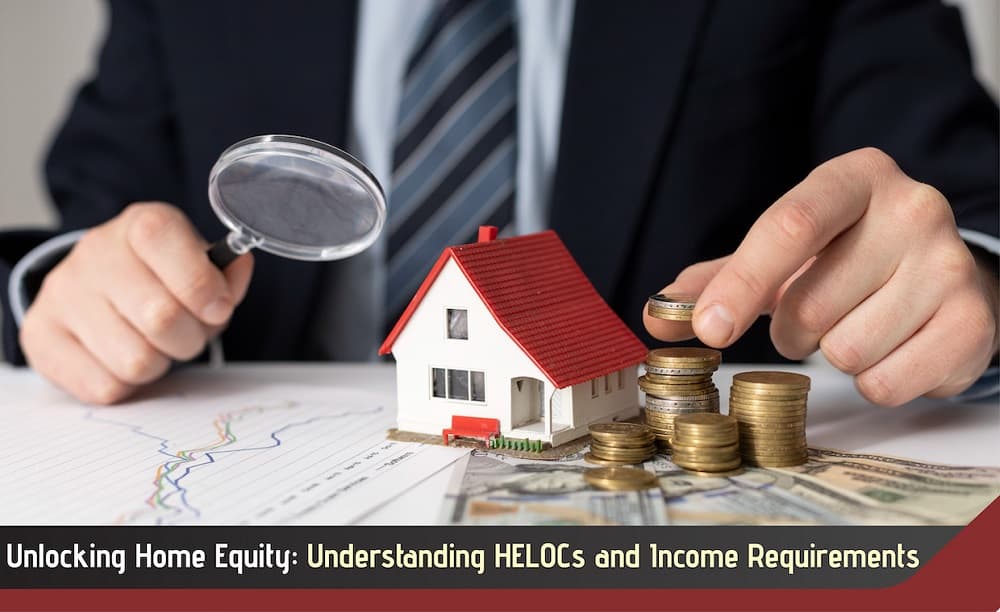
Building equity in a home is one of the most significant benefits of buying a home. When you build sufficient equity on a property, you can leverage it to secure a home equity line of credit (HELOC). Given that the equity on your home acts as your collateral, you could wonder if your level of income matters when applying for a HELOC. The answer to your question can be a yes or a no. This guide explores the aspects of HELOC you need to know, which can help give you a better answer, so keep reading.
What is HELOC

A HELOC is a line of credit allowing property owners to borrow funds against home equity. Equity is the difference between a property’s appraised value and what the owner owes on the mortgage. It is a revolving line of credit in that you can borrow and repay as you go, just like you would take a credit card debt. A borrower can utilize the funds borrowed under HELOC for any purpose, including home improvement, large purchases and unexpected expenses such as medical bills.
Income Doesn’t Always Matter, but it is Important

As mentioned earlier, you can access a HELOC even if you do not show a source of income. The purpose of showing a source of income when taking a loan is to show that you can repay the borrowed funds without struggle. When it comes to HELOC, your equity is your collateral and defaulting on your loan could mean losing your equity. However, many lenders still look at a borrower’s income level when determining their eligibility for HELOC. Also, having a higher income will influence how much funds a lender will be willing to lend. Some documents lenders may demand as proof of income include pay stubs which you can generate using a paystub generator or get from your employer. Other details lenders may ask are W2 forms, employer contact information, and other tax return forms.
Other Considerations for Lenders

01. Debt Income Ratio
Besides having an income, lenders will also be interested in the percentage of disposable income you have, and that is where the debt to income (DTI) ratio comes into play. Qualifying DTI ratios vary with the lender. For some, a debt that takes up 36% of your income will be too high, while others will be okay with a DTI ratio of up to 50%. To get your DTI ratio, get the sum of your gross monthly income and divide it by your financial obligations such as mortgage payments, direct liens, home association obligations, bills etc. and multiply the figure you get by a hundred.
02. Credit Score
Like other forms of credit, lenders require that HELOC borrowers meet a specific credit score. Like the DTI ratio, credit score requirements will vary with the lender. Typically banks will readily accept borrowers with a credit score of 700 and above. But since a HELOC is borrowed against property equity, lenders can approve borrowers with a 650 credit score rating or even lower. However, lower credit scores tend to attract higher interest rates and shorter terms. So if you are considering getting a HELOC, repair your credit score beforehand by clearing outstanding debts and avoiding other debts. It is also important to consider that poor credit history may also be a consideration for lenders. Lenders may not look favorably on your loan application if you have a history of defaulting.
What Makes HELOCs Better than other forms of Lending

HELOC offers many advantages to borrowers, making it among the best options for borrowing funds. First, it offers some of the most competitive interest rates. Because HELOCS are low-risk loans, lenders tend to charge lower interest. According to Bank rate, the average HELOC loan as of 2023 is 5.84%, while the average personal interest rate is 10.16%. Also, HELOC-eligible borrowers can borrow funds, allowing them to control how much and when to borrow. Lastly, the tax paid on the interest is tax-deductible, translating into financial benefits.
Final Words
While accessing HELOC without showing proof of income is possible, in most cases, you have to. Also, your income affects the funds you can access, so it is best to show your income. As highlighted in this post, there is more to securing a HELOC loan than proof of income. Other factors such as debt-to-income ratio, credit score, credit score and credit history also play a critical role. Before you leave, make sure to check detailed blog on home loan:
10 Mistakes to Avoid While Taking a Home Loan!






























